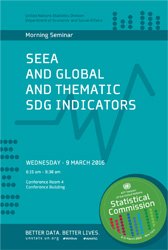United Nations Statistical Commission
47th Session (2016) Side Events
Morning Seminar
SEEA and global and thematic SDG indicators
- Wednesday, 9 MAR 2016
- 8:15 - 9:30am
- Conference Room 4 (CB)
Meeting organized by UNSD
The Sustainable Development Goals (SDGs) represent a shift in global policy from a predominantly economic focus to more holistically include the environment, society and governance. Measuring the SDGs will therefore require an increasingly integrated approach at the national and international level, based on a better understanding of the interactions and trade-offs between different aspects of sustainability. This should be supported by an improved system of information which comprehensively and coherently integrates environmental, economic and social information. The System of Environmental Economic Accounting (SEEA) provides the necessary statistical framework to support this, focusing on the integration of environmental information with economic information from the System of National Accounts.
To optimize the monitoring process for the SDGs, the monitoring framework employed should be comprised of indicators selected based on their ability to meet minimum requirements ensuring policy relevance, analytical and methodological soundness, and practicality of measurement. The SEEA, adopted as the international statistical standard in 2012, has been recognized as an important tool in this monitoring process for integrating data; both through its capacity to support the derivation of indicators robust to these requirements, and through its role in integrating and streamlining the statistical production process for the more efficient production of environmental-economic indicators at the national level.
Individual SDGs address different aspects of the environment and its relationship with the economy, and the way in which these different goals are monitored should take a coherent approach to support the integrated policy agenda. The SEEA takes a consistent approach to measuring different environmental issues (including water, energy, air emissions, land, forestry, agriculture, etc). By providing a standard set of definitions, classifications and methodologies for integrating information, use of the SEEA ensures a more robust set of indicators which integrate across goals. Furthermore, the use of the SEEA to support monitoring for specific goals can also ensure a standards-based approach which is coherent across individual targets. For example, in the case of Goal 6 (water) the SEEA provides a basis to develop an integrated monitoring approach to assessing water and wastewater flows between the environment and the economy in a coherent way. This supports robust measurement of a number of water indicators and their disaggregation by industrial sector.
Furthermore, Sustainable Consumption and Production (SCP) (specifically identified in goal 12 but also identified as a cross cutting enabler for other goals) relates to the efficient use of services and related products while minimizing the use of natural resources and toxic materials as well as the emissions of waste and pollutants. The accounting approach used by the SEEA provides a mechanism to measure a number of SCP related indicators, by linking physical flow information with economic information (to support decoupling analysis), providing a mechanism to assess the environmental impact of economic activities, and highlighting financing and investment for SCP.
The speakers at the side events will provide concrete examples of the use of the SEEA for the definition of SDG indicators related to water, SCP and agriculture for global and national monitoring and reporting.
- Mr. Bert Kroese – Deputy Director General, Statistics Netherlands and Chair, United Nations Committee of Experts on Environmental-Economic Accounting
- Mr. Pietro Gennari – Chief Statistician and Director, Statistics Division, Food and Agriculture Organization of the United Nations
- Ms. Viveka Palm, Statistics Sweden
- Mr. Rifat Hossain, Technical Officer, World Health Organization
- Mr. Oliver Herrmann, Director, Statistics and Tourism Satellite Account Programme, World Tourism Organization
